|
Murano
Authors: Inka & Markus Brand
Publisher: Lookout Games
Year: 2014
review by

| x |
|
|
|
|
|
|
|
|
|
|
|
|
|
|
|
|
|
|
|
|
|
|
|
|
|
|
|
|
|
|
|
|
|
|
|
|
|
|
|
|
|
|
|
|
|
|
|
|
|
|
|
|
|
|
|
|
|
|
|
|
|
 |
In the lagoon harbouring Venice, some more islands are located. One of those is Murano, famous for its glassblowing and crafty facades. Thousands of tourists are drawn toward this island for a mosquito-infested trip on one of the vaporetto’s. This particular island is the setting where two to four players fight for victory points. Building glass factories, shops or palaces brings immediate victory points, but the majority of the points can be earned at the end of the game when scoring the character cards.
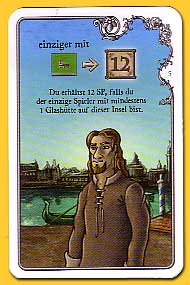
|
|
|
| x |
|
|
|
|
|
|
|
|
|
|
|
|
|
|
|
|
|
|
|
|
|
|
|
|
|
|
|
|
|
|
|
|
|
|
|
|
|
|
|
|
|
|
|
|
|
|
|
|
|
|
|
|
|
|
|
|
|
|
|
|
|
|
Several ships are moving leisurely around the island. In a player’s turn, he moves one of the ships to an available location, and carries out the corresponding action. Many of the actions cost a certain amount of gold, like purchasing a glass factory, a shop, a palace or a special building. Other actions that require money are placing a gondolier on the board, hiring additional gondoliers or purchasing a character card. Altogether, you need a lot of money!
|
|
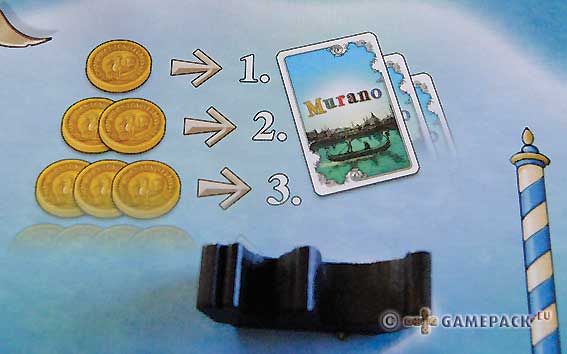 |
|
|
| xx |
|
|
|
|
|
|
|
|
|
|
|
|
|
|
|
|
|
|
|
|
|
|
|
|
|
|
|
|
|
|
|
|
|
|
|
|
|
|
|
|
|
|
|
|
|
|
|
|
|
|
|
|
|
|
|
|
|
|
|
|
|
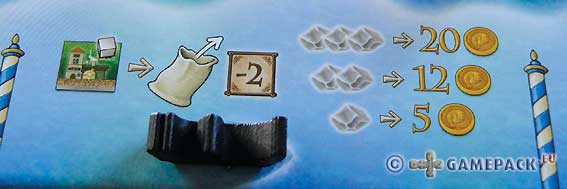 |
|
Luckily there are several ways to earn some: two coins at one of the locations around the board, or up to 20 coins by activating the glass factories. To accomplish the latter, certain criteria must be met: he must possess at least three glass factories, and he has to draw three glass cubes of the same colour from the bag. Two cubes of the same colour can still be sold for 12 coins, and one single cube of any colour for five coins. |
|
|
| x |
|
|
|
|
|
|
|
|
|
|
|
|
|
|
|
|
|
|
|
|
|
|
|
|
|
|
|
|
|
|
|
|
|
|
|
|
|
|
|
|
|
|
|
|
|
|
|
|
|
|
|
|
|
|
|
|
|
|
|
|
|
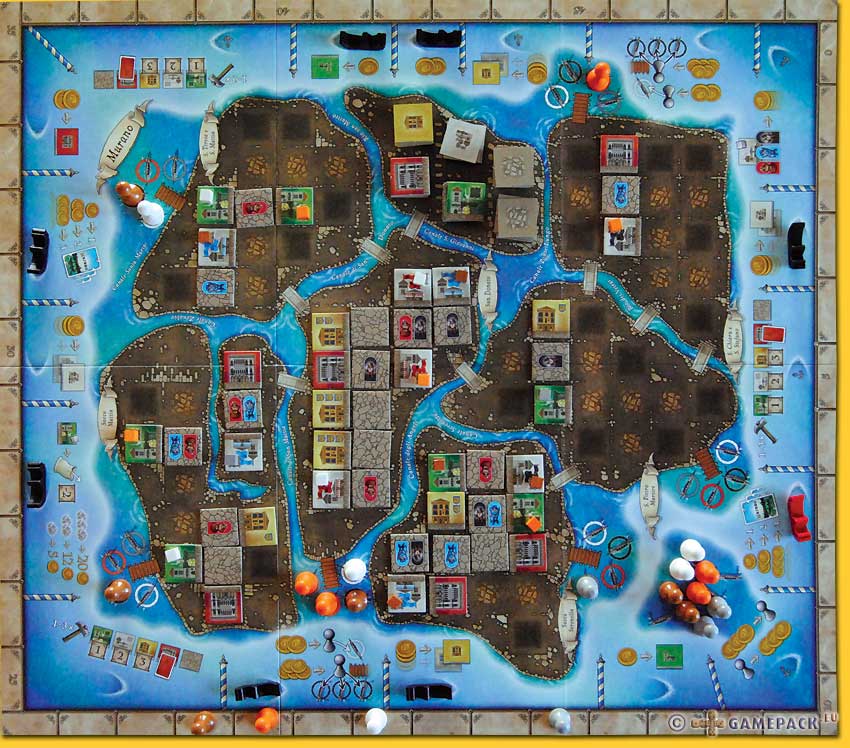 |
| x |
|
|
|
|
|
|
|
|
|
|
|
|
|
|
|
|
|
|
|
|
|
|
|
|
|
|
|
|
|
|
|
|
|
|
|
|
|
|
|
|
|
|
|
|
|
|
|
|
|
|
|
|
|
|
|
|
|
|
|
|
|
| Unfortunately, glass manufacturing is a very polluting trade. To compensate for this, the player loses two victory points per activated glass factory. But at least his wallet has been filled, and he can acquire all sorts of things for a while. For example a character card, which can be done at two locations on the board. The first card costs one coin, the second card two, et cetera. The cards describe certain conditions that have to be met in order to score points at the end of the game. For example, you have to be the only one with a glass factory on a specific island, or the number of shops of a specific colour has to be equal to the number of special buildings on that same island. When purchasing a character card, a player may always draw three and choose one. |
|
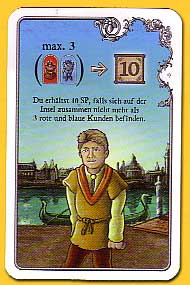 |
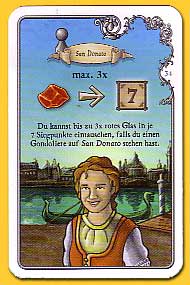 |
| x |
|
|
|
|
|
|
|
|
|
|
|
|
|
|
|
|
|
|
|
|
|
|
|
|
|
|
|
|
|
|
|
|
|
|
|
|
|
|
|
|
|
|
|
|
|
|
|
|
|
|
|
|
|
|
|
|
|
|
|
|
|
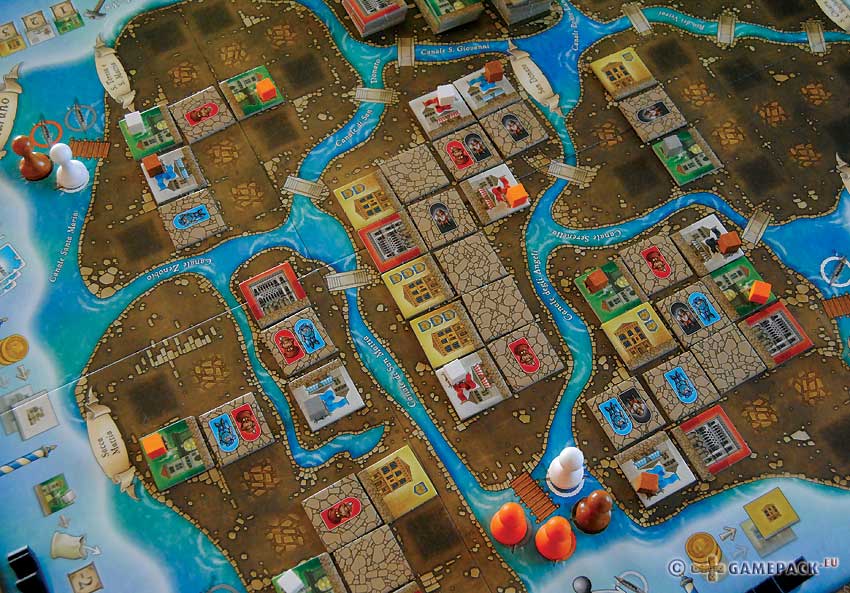 |
| x |
|
|
|
|
|
|
|
|
|
|
|
|
|
|
|
|
|
|
|
|
|
|
|
|
|
|
|
|
|
|
|
|
|
|
|
|
|
|
|
|
|
|
|
|
|
|
|
|
|
|
|
|
|
|
|
|
|
|
|
|
|
One additional requirement is that the card only scores points if the player also has a gondolier present at the island concerned. Placing a gondolier on an island costs two coins if the location of his colour is still available, and five coins if he is forced to place his gondolier on another player’s spot. It is very well possible that one player has multiple character cards involving the same island, and therefore he needs more than one gondolier at that island.
Moving around the ships can result in a major traffic jam, since the ships are not allowed to overtake each other. An action that is occupied with a ship is therefore not available. At some additional costs, the traffic jams can be resolved, but since money is very tight, players will probably try to find a different, cheaper solution if possible.
|
|
|
| x |
|
|
|
|
|
|
|
|
|
|
|
|
|
|
|
|
|
|
|
|
|
|
|
|
|
|
|
|
|
|
|
|
|
|
|
|
|
|
|
|
|
|
|
|
|
|
|
|
|
|
|
|
|
|
|
|
|
|
|
|
|
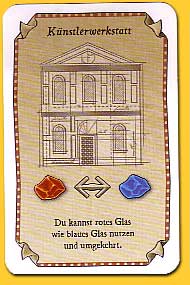 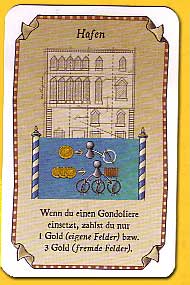 |
Erecting a special building, which doesn’t score any immediate victory points, can be feasible if it is part of the conditions of a character card, but another reason to build special buildings is to receive special building cards. These cards give the player an advantage for the rest of the game, like placing gondoliers at a lower cost, or changing the colour of the glass cubes drawn from the bag. |
|
|
| x |
|
|
|
|
|
|
|
|
|
|
|
|
|
|
|
|
|
|
|
|
|
|
|
|
|
|
|
|
|
|
|
|
|
|
|
|
|
|
|
|
|
|
|
|
|
|
|
|
|
|
|
|
|
|
|
|
|
|
|
|
|
 |
|
The game is over as soon as the supply of two of the five different types of buildings have been exhausted. All players have one final turn.
Murano is a pleasant game, but the stress levels can rise at the end of the game, when gondoliers still have to be placed but the required coins are not available yet. When the players are more familiar with the game, and the nature of the character cards is more or less known, mean little tricks can be carried out. For example, if an island contains only one glass factory, one can guess that this is actually someone’s victory condition. If it is not too much effort, it is always funny to build a second glass factory and thereby deny the other player 12 points! |
|
|
| x |
|
|
|
|
|
|
|
|
|
|
|
|
|
|
|
|
|
|
|
|
|
|
|
|
|
|
|
|
|
|
|
|
|
|
|
|
|
|
|
|
|
|
|
|
|
|
|
|
|
|
|
|
|
|
|
|
|
|
|
|
|
Murano is a smooth and well-oiled game that works well with any number of players, and one of the better family games of last year’s Essen!
© 2014 Richard van Vugt
Murano, Inka & Markus Brand, Lookout Games, 2014 - 2 to 4 players, 10 years and up, 60 minutes
|
|
|
|
|
|
  |
|
|
|
|
|
|
|
|
|
|
|
|
|
|
|
|
|
|
|
|
|
|
|
|
|
|
|
|
|
|
|
|
|
|
|
|
|
|
|
|
|
|
|
|
|
|
|
|
|
|
|
|
  |
|
|
|
|
|
|
|
|
|
|
|
|
|
|
|
|
|
|
|
|
|
|
|
|
|
|
|
|
|
|
|
|
|
|
|
|
|
|
|
|
|
|
|
|
|
|
|
|
|
|
|
|
  |
|
|
|
|
|
|
|
|
|
|
|
|
|
|
|
|
|
|
|
|
|
|
|
|
|
|
|
|
|
|
|
|
|
|
|
|
|
|
|
|
|
|
|
|
|
|
|
|
|
|
|
|
  |
|
|
|
|
|
|
|
|
|
|
|
|
|
|
|
|
|
|
|
|
|
|
|
|
|
|
|
|
|
|
|
|
|
|
|
|
|
|
|
|
|
|
|
|
|
|
|
|
|
|
|
|
  |
|
|
|
|
|
|
|
|
|
|
|
|
|
|
|
|
|
|
|
|
|
|
|
|
|
|
|
|
|
|
|
|
|
|
|
|
|
|
|
|
|
|
|
|
|
|
|
|
|
|
|
|
| x |
|
|
|
|
|
|
|
|
|
|
|
|
|
|
|
|
|
|
|
|
|
|
|
|
|
|
|
|
|
|
|
|
|
|
|
|
|
|
|
|
|
|
|
|
|
|
|
|
|
|
|
|
|
|
|
|
|
|
|
|
|
| x |
|
|
|
|
|
|
|
|
|
|
|
|
|
|
|
|
|
|
|
|
|
|
|
|
|
|
|
|
|
|
|
|
|
|
|
|
|
|
|
|
|
|
|
|
|
|
|
|
|
|
|
|
|
|
|
|
|
|
|
|
|
 |
|
|
|
|
|
|
|
|
|
|
|
|
|
|
|
|
|
|
|
|
|
|
|
|
|
|
|
|
|
|
|
|
|
|
|
|
|
|
|
|
|
|
|
|
|
|
|
|
|
|
|
|
 |
|
|
|
|
|
|
|
|
|
|
|
|
|
|
|
|
|
|
|
|
|
|
|
|
|
|
|
|
|
|
|
|
|
|
|
|
|
|
|
|
|
|
|
|
|
|
|
|
|
|
|
|
| x |
|
|
|
|
|
|
|
|
|
|
|
|
|
|
|
|
|
|
|
|
|
|
|
|
|
|
|
|
|
|
|
|
|
|
|
|
|
|
|
|
|
|
|
|
|
|
|
|
|
|
|
|
|
|
|
|
|
|
|
|
|
 |
|
|
|
|
|
|
|
|
|
|
|
|
|
|
|
|
|
|
|
|
|
|
|
|
|
|
|
|
|
|
|
|
|
|
|
|
|
|
|
|
|
|
 |
|
|
|
|
|
|
|
|
|
|
|
|
|
|
|
|
|
|
|
|
|
|
|
|
|
|
|
|
|
|
|
|
|
|
|
|
|
|
|
|
|
|
|
|